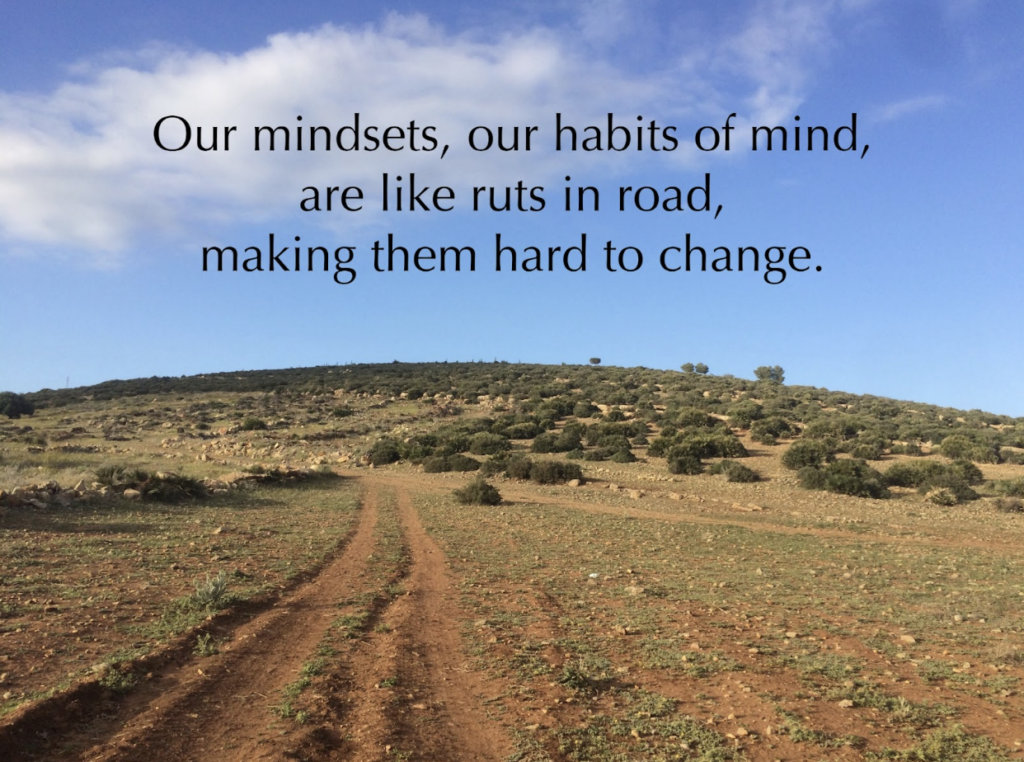THE POWER OF MINDSETS
THE POWER OF MINDSETS

Our mindsets direct the experience of our lives toward happiness or misery.
Henry Ford wisely noted: “Whether you think you can or think you can’t – you’re right.”
Our state of mind has a huge impact on how we experience life. We can choose one way of thinking – “I can” – and the result is that we work at a problem until we solve it because we believe we can. Or we can choose “I don’t think I can” and the result is that we stop trying because . . . “What’s the use?” We don’t believe we can.
In his infinite wisdom, Buddha said, “What we think, we are.” What we think, we feel – stress or joy. What we think, we behave accordingly.
Awakening Wisdom focuses on the power of mindsets because our mindsets have an impact on how we are dealing with stress and the challenge of being an educator or student in today’s world.
Stephen Covey said that we do have a choice about what mindset we choose to have. And this, he says, is one of our most powerful gifts of being human. Most of us are not aware we have a choice; we react automatically to certain situations, programmed by the unconscious mindsets we acquire over our life’s journey since childhood.
In a recent professional development session with a school in Hawai’i, I used an image of the ruts in the road caused by the many wagon wheels making their way west. Our mindsets are like that – ruts in the road – where our ways of thinking have a hard time changing.
Shifting mindsets is hard work. We think that our mindsets define us, fixed in stone. “That’s who I am.” We keep repeating the behaviors, sourced by the mindsets; and our experience of life, our experience of challenges doesn’t change. We become victims of the challenges, blaming others – the demanding parents, the button-pushing students, the uncooperative colleagues, the misguided administrators.
Yes, the messages from an unhealthy school culture have a big impact on administrators, teachers, and students. Awakening Wisdom is a school culture approach to social emotional well being and one of the key elements of our approach focuses on helping educators to choose to shift their mindsets toward more thriving for themselves and for their students. This in turn slowly begins to change the culture toward health.
We invite faculty to look at their mindsets that limit their power to be effective educators. Common ones are perfectionism and the concomitant fear of making mistakes and worrying about what others think. In our work with schools, teachers recognize these limiting mindsets in themselves. Once we create a trusting environment among the community of teachers and administrators, they are willing to explore these habits of mind in order to shift their thinking toward more life-giving, empowering ones.
From teachers in Awakening Wisdom’s course during the first year of the pandemic:
- From the Awakening Wisdom’s Foundations course this semester, I have found I have more time to prepare my mind prior to working to de-stress before I start the day. I feel I am more kind to myself instead of beating myself up.
- I have learned that I am stronger than I think. That my mindset and way of thinking can make a difference in changing and becoming the person that I want to be. I have also learned that the way I view myself impacts my actions. I also learned that I am more likely to be resilient when I have a safe place to go to and when I have people that I can trust support me.
NOTE: Linda Inlay will be presenting The Power of Mindsets at the Schools of the Future Conference in Hawai’i in November.
WELCOME
Awakening Wisdom is based on the Ho`āla Educational Philosophy, founded in large part by Sr. Joan Madden, BVM, and has been finely tuned over the past 42 years at three schools, Our Lady of Sorrows and Ho`āla School, both in Wahiawa, HI, and River School in Napa, CA.
